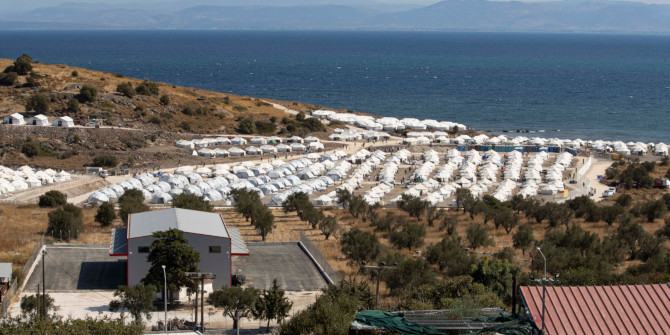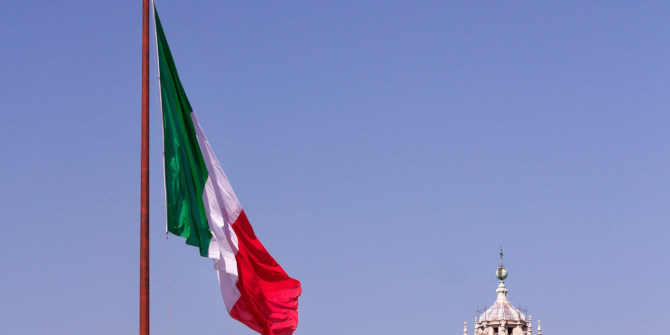 A late surge in support for the left-wing candidate Jean-Luc Mélenchon has added an extra layer of drama to France’s presidential election ahead of the first round of voting on 23 April. With Mélenchon now polling close enough to the leaders that he has a chance of making it to the second round, Marco Damiani traces his political career and assesses what it might mean for France if he secures an unlikely victory.
A late surge in support for the left-wing candidate Jean-Luc Mélenchon has added an extra layer of drama to France’s presidential election ahead of the first round of voting on 23 April. With Mélenchon now polling close enough to the leaders that he has a chance of making it to the second round, Marco Damiani traces his political career and assesses what it might mean for France if he secures an unlikely victory.
With the first round of France’s presidential election fast approaching, Jean-Luc Mélenchon has sharply risen in opinion polls to become an unexpected key player in the campaign. As the leader of La France Insoumise (Unsubmissive France), a movement founded in 2016 without any expectation of victory, Mélenchon, a political outsider, has come to embody one of the main expressions of change in the eyes of voters. But who is Mélenchon? And what are the reasons for his sudden personal success?
Political history
Born in Tangier in 1951, Mélenchon was a university student during the French protests of May 1968, becoming the leader of the student movement at the University of Besançon. He graduated in philosophy in 1972, but politically he was a “Lambertist”, a member of the French Trotskyist movement, and after 1971 he joined the Socialist Party of François Mitterrand. With the Socialist Party, from 2000 to 2002, he was proclaimed Minister of Vocational Education in the government of the gauche plurielle led by Lionel Jospin. He left the party after the referendum on the Treaty establishing a Constitution for Europe: French voters rejected the proposed constitution in May 2005 thanks to strong opposition from a political campaign in which Mélenchon took part.
After leaving the socialist party, he founded the Parti de gauche with the intention of establishing a single radical left coalition. These ambitions ultimately led to the creation of the Front de gauche, which was able to unify a long list of parties on the left of the Socialist Party. He ran in the 2012 presidential election with the Front, obtaining 11 per cent of the vote: the first time the non-socialist left had registered a double figure result since Georges Marchais in 1981. Notwithstanding the positive electoral outcome, his experience with the Front de gauche, which was marked by internal conflicts and a poor level of organisation, ended after the European elections of 2014, when the coalition received just under 7 per cent of the votes.
Mélenchon, however, did not withdraw from public life, and kept nurturing his political aspirations. The turning point came with the birth of a new social cleavage in spring 2016, centred around the political demonstrations that erupted in France over the new labour law approved by Manuel Valls’ socialist government. Street demonstrations lasted three months (from March to May), but no established party managed to derive the political capital from the mobilisation or take a lead over the organisation of the protests.
Despite some notable differences, the French demonstrations of 2016 resembled those in other southern European states. There were particular similarities with the indignados of Spain. The two countries are very different, and French socio-economic conditions cannot be compared with those in Spain at the time, but both protest movements shared key similarities. For the first time in the 21st century, mobilisations were not led by workers, nor the working class alone, but by a heterogeneous plurality of citizens.
First in Madrid, then in Paris, students, workers, retirees, housewives, artisans, business owners, employees, self-employed professionals, scholars, and university professors took to the streets. They were women and men who were not necessarily united by strong political ideals, but who shared in the sacrifices made to meet the costs of the financial crisis. They were people from very different class origins, cultural backgrounds and age groups, but they had a common cause in the fight for better living conditions. It was from this starting point that La France Insoumise, and Mélenchon’s campaign, emerged.
An unlikely victory?
La France Insoumise may have had different origins, but there are parallels too with the Occupy movement. Much like Occupy’s focus on the plight of the 99% against those at the top of society, Mélenchon identifies the Europe of banks and the traditional political class as the target of his struggle. Following the example of Ernesto Laclau, his success lies in tapping into currents of change and building a community around them that encompasses not only workers, but citizens more broadly, to whom he offers an alternative project to neoliberalism.
This lies at the heart of his transformation from Trotskyist outsider to populist leader, though his approach is a different kind of ‘populism’ to that adopted by Marine Le Pen and the Front National. Mélenchon has been able to respond to demands from a fragmented society and give them a sense of collective belonging which was missing from traditional left-wing ideologies. He has shunned utopian socialism, red flags and the other typical icons of the French left. Instead, he has directed his message, in simple language that is free from ideological baggage, to the whole of society in a manner that is understandable for all.
The goal has been to simultaneously overcome the radical left’s ‘subordinate’ status to the Socialist Party (whose candidate, Benoît Hamon, has virtually vanished from consideration in this election), while putting forward a plan for radical political change. Mélenchon firmly supports neo-Keynesian reforms, such as the regulation of the economy and the market, investment in the protection of the environment, a boost in welfare, and universal healthcare. And to accomplish this, he is not afraid of putting forward proposals aimed at recovering national sovereignty from international organisations that constrain the hands of the state in making important political and social choices.
On 23 April, voters will have a chance to write an unusual chapter in contemporary French history should Mélenchon make it to the second round.
Please read our comments policy before commenting.
Note: This article gives the views of the author, and not the position of EUROPP – European Politics and Policy, nor of the London School of Economics.
_________________________________
 Marco Damiani – University of Perugia
Marco Damiani – University of Perugia
Marco Damiani is an Assistant Professor in Political Science at the University of Perugia. He has published widely on parties of the European radical left.






Mélenchon’s polls scores are very inflated by annoyed socialists voters with Hollande austerity. Many of them after reflexion day in the scrutiny day will get back to left wing pro-european candidacy of the socialiste Benoît Hamon. The question is: How many?